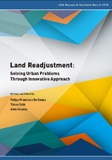Land Readjustment: Solving Urban Problems Through Innovative Approach

Urbanization is accelerating in developing countries, which is having an adverse effect on sustainable development, and leading to urban sprawl, slums, inadequate urban infrastructure, human insecurity, air and water pollution, and vulnerability to disasters. The lack of proper planning could result in some areas of these cities becoming uninhabitable, with severe implications for access to jobs, education, and cultural and healthcare services, not to mention a safe and clean environment.
This book introduces land readjustment as an effective approach to addressing such urban problems, which is known as the “mother of urban planning” in Japan but is still relatively unknown in other countries. Based on experiences in Japan and other countries, this volume explores how these experiences have been applied in developing countries, offering a dozen case studies.
The book discusses two significant social benefits provided by land readjustment; community cohesion is maintained or fostered, and the equitable distribution of the costs and benefits of the urbanization process is assured. Conversely, the use of eminent domain, or land expropriation often results in reorganization problems in developing countries by its very nature, due to people being forced off their land for public use.
Akio Hosono, editor of the book and a senior research advisor at the JICA Research Institute, says that the land readjustment approach can support international cooperation in urbanization by ensuring that urban development is inclusive, equitable, safe, resilient, and sustainable, which coincides with UN Sustainable Development Goal 11: “Make cities and human settlements inclusive, safe, resilient and sustainable.”
scroll